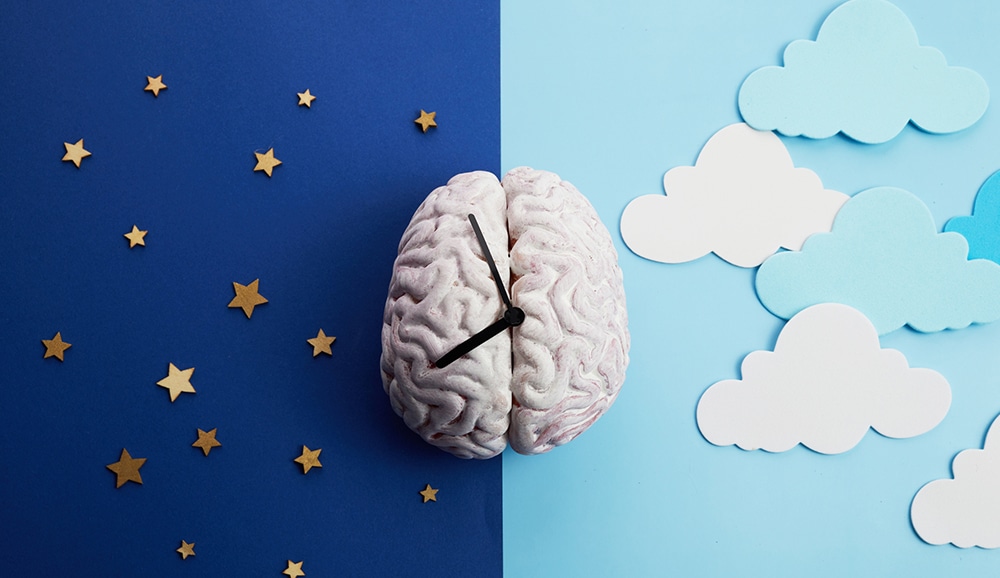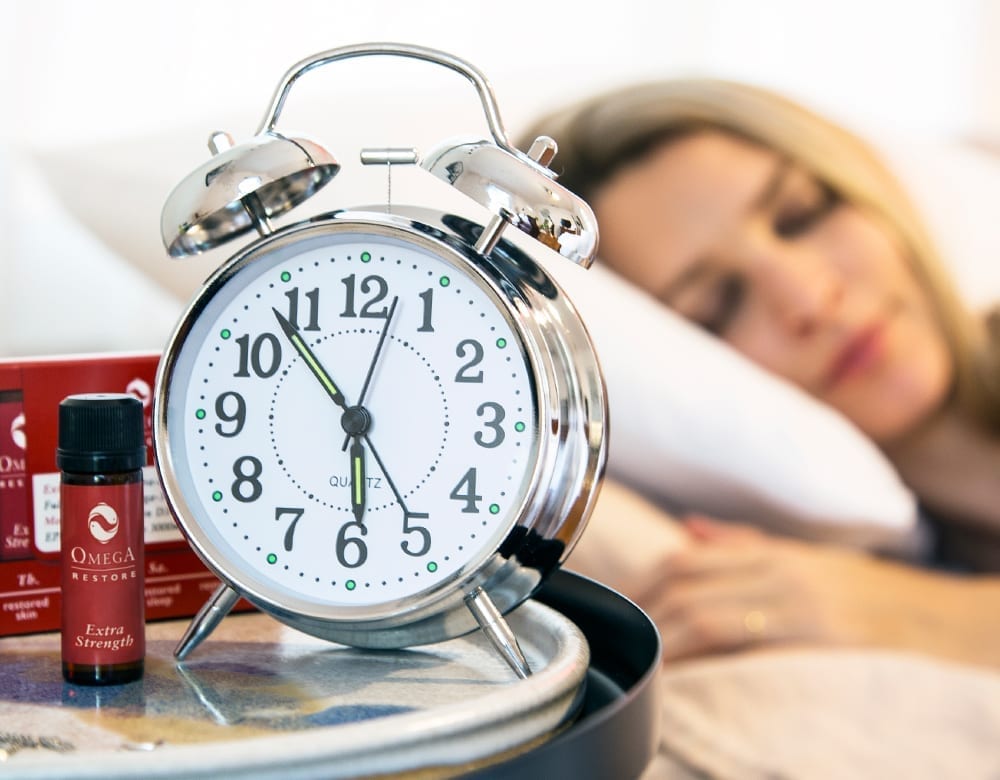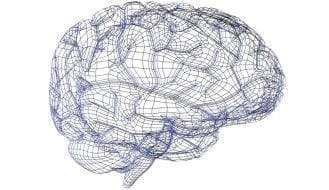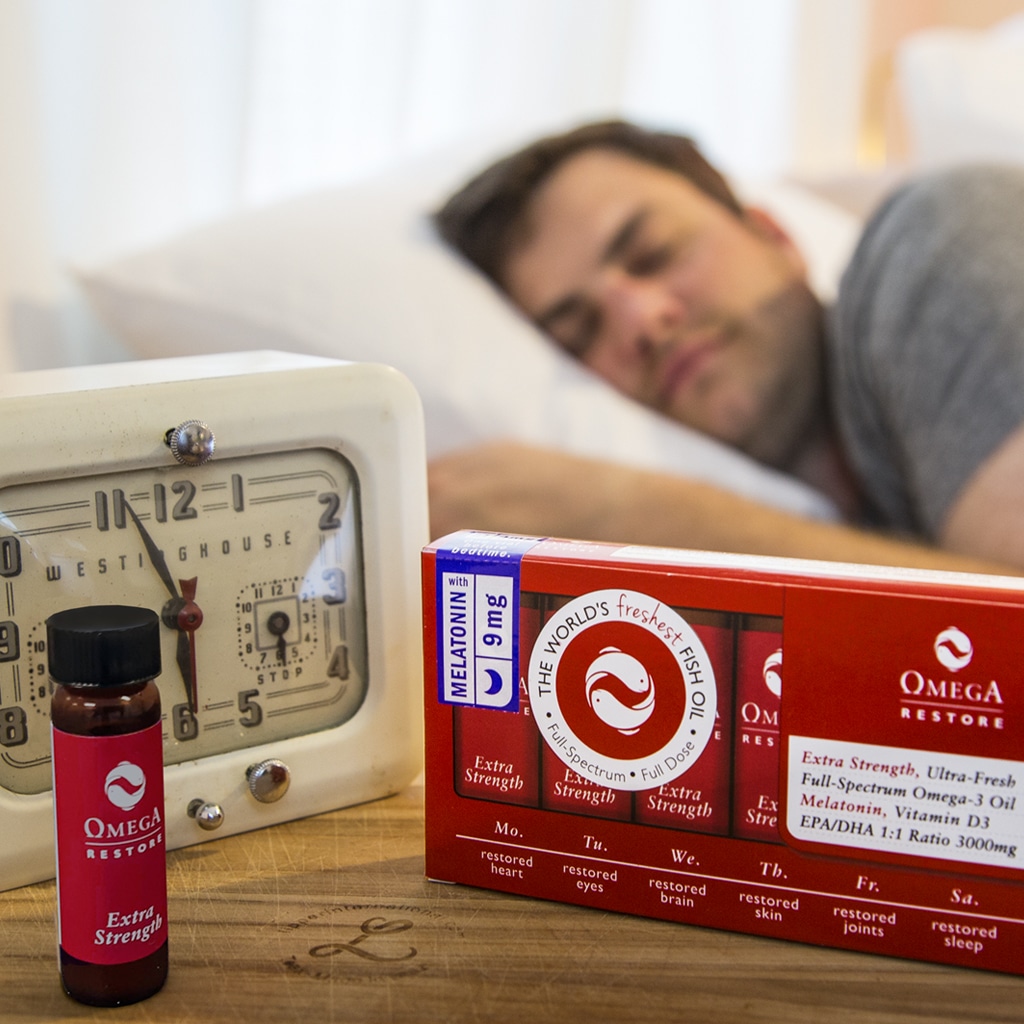Does Melatonin Help With Anxiety?
Anxiety is on the rise, no doubt about it. In 2024, 43% of adults reported feeling more anxious than they did the year prior. That’s up from 37% in 2023 and 32% in 2022, according to the American Psychiatric Associations’ annual poll.
For those who struggle with an anxiety disorder, there’s good news about melatonin. Many people think of melatonin as helping with sleep. But this nutrient also has important benefits for the brain, gut and more. In fact, clinical studies suggest melatonin may support our mood and protect our bodies during stressful times.
Let’s explore the relationship between melatonin and anxiety, how melatonin’s effects compare to anti-anxiety drugs, and strategies for making sure you get the best results from melatonin supplementation.
What is Melatonin?
Melatonin is often described as a hormone. The term “hormone” can conjure up thoughts of testosterone-popping bodybuilders. But “hormone” just means a signaling molecule that exerts its effects far from its site of production.
Many kinds of molecules can be classified as hormones, including vitamin D. Both vitamin D and melatonin are influenced by the body’s exposure to sunlight and have similar benefits for the brain and the immune system.

How does the body know it’s time to sleep? For one, our body produces melatonin to regulate our sleep.
Melatonin has often been called “the hormone of darkness” or the “sleep hormone.” That’s because the body produces melatonin in part in response to darkness. Our natural melatonin production normally increases in the evening, signaling to the body that it’s time to wind down and prepare for sleep. When melatonin levels decrease again in the morning, it helps you wake up and feel alert.
Regulating our sleep-wake cycles is not all melatonin does. This multi-tasking molecule also plays a role in regulating blood pressure, improving lipid metabolism and weight, reducing inflammation, and even fighting cancer. It’s essential for life and found in many of the foods we eat, including fish, nuts, and milk [1].
The Relationship Between Melatonin & Anxiety
For a long time, scientists have been curious about the connection between melatonin and anxiety because of melatonin’s role in sleep. Research shows that sleep and anxiety are deeply entwined. For example, people with anxiety often also have trouble falling asleep, or have a sleep disorder like insomnia [2].
The relationship between sleep and mood disorders is a catch-22 situation. Getting a good night’s sleep helps with anxiety. But if you are anxious, your body goes into fight or flight mode, making it harder to get good rest. To make matters worse, when you are sleep-deprived, your body produces higher levels of stress hormones, which can increase anxiety.
Getting adequate, high-quality sleep can help regulate these stress hormones and improve emotional resilience. But how to get that high-quality sleep is the question.
How Melatonin Works
As noted above, one of melatonin’s big jobs is to regulate our sleep-wake cycle (or circadian rhythm). Melatonin is synthesized in the pineal gland in the brain in response to darkness. This melatonin stimulates the MT1 and MT2 receptors found in the brain and retina [3]. When melatonin binds to these receptors, it causes your body temperature to sink, making you feel drowsy. This helps people fall asleep and stay asleep.
Beyond the pineal gland, melatonin is also made inside the cells of most of our organs. This cellular melatonin works as an antioxidant and free radical scavenger. Why does this matter? When we get stressed, our bodies can get overwhelmed by harmful free radicals. We need enough antioxidants to protect our cells from damage.
Both because of its sleep impact and how it fights free radicals, there’s a strong scientific basis for why melatonin could benefit people with an anxiety disorder.
Evidence Supporting Melatonin for Anxiety
In clinical trials related to anxiety, melatonin supplements have shown promising results. Many studies have explored how melatonin impacts anxiety symptoms or anxiety side effects. Let’s take a closer look:
Melatonin for Acute Anxiety
A good way to study anxiety is to look at patients having surgery. Most of us feel uncomfortable going under the knife, so the body responds by increasing blood pressure and heart rate.
A number of studies have compared taking melatonin before surgery with typical anti-anxiety medications. Here is what they found:
• Just as effective, with fewer side effects: A meta-analysis of 11 studies found that melatonin had similar effects to benzodiazepines, like Valium, for reducing anxiety post surgery. The researchers also noted that melatonin seemed to be better tolerated than the anti-anxiety drug, with fewer side effects [1, 4].
• Faster recovery: Similarly, a study comparing the effects of melatonin versus midazolam in children also found that melatonin was equally effective as the drug in reducing preoperative anxiety. Plus, the children who got melatonin trended toward faster recovery and fewer sleep disturbances post operation [1].
• Reduced pain and anxiety: Another study looking at cataract patients found similar results. The patients, who had all received topical anesthesia, either got melatonin or placebo before their operation. Patients treated with melatonin had significantly lower anxiety and pain scores compared to placebo [5].
Supporting the Body through Stress
We all know that anxiety can take a toll on our physical health. When we’re anxious, our bodies experience an increase in oxidative stress and harmful free radicals. These free radicals can damage our cells and impair their normal functions. Long term, unchecked oxidative stress causes health problems. Oxidative stress plays a role in the onset of many diseases, including heart disease and cancer.
To combat oxidative stress, we need enough antioxidants. Antioxidants help neutralize the free radicals and protect our cells.
Anxiety and oxidative stress are deeply interconnected. In fact, researchers are asking a chicken and egg question. Does oxidative stress contribute to anxiety? Or is oxidative stress a symptom of anxiety? In either case, studies show that people with anxiety have fewer antioxidant defenses. In fact, a number of experts recommend antioxidant treatment for people with anxiety disorders [6].
Melatonin is nature’s most powerful antioxidant and free radical scavenger. This non circulating form of melatonin is typically found in the mitochondria or areas of the cells with a high content of fatty acids.
To date, there have been few clinical studies measuring melatonin’s effects related to this process. But a 2024 meta-analysis on postmenopausal women found that melatonin significantly improved menopausal anxiety [7].

Melatonin’s Role in the Gut: The gut contains over 400X more melatonin than the pineal gland (that’s the part of the brain that produces melatonin at night).
Supporting the Gut Microbiome
In the last few years, few things have received more attention in medicine than the impact of the microbiome on health. This extends to mental health as well. The microbiome, or the bacteria that live in our gut, has a direct impact on our mood. Simply put, the healthier our microbiome is, the better we feel in body and spirit.
Interestingly enough, the intestinal tract and its cell lining contains more than 400 times the amount of melatonin than the pineal gland [8].
Animal studies show that melatonin may impact the gut microbiome in a positive way, resulting in improved intestinal surface barriers. They also show a reduction in inflammation markers that may interact with the vagus nerve and thereby the brain.
Sleep deprivation reduces gut melatonin content and creates dysbiosis. So it’s fairly easy to conceive that this is yet another way melatonin influences our reaction to stress or anxiety. But we still have a lot to learn on this front. It is not yet clear how melatonin works on the intestinal microbes, so more research is still needed.
Why Many of Us Need More Melatonin
Since melatonin is produced by the body, you may wonder why people take melatonin supplements at all. There are a number of reasons why many of us get far less melatonin than we need for optimal wellbeing, including:
1) Light at night: When we expose ourselves to light at night, it stops our bodies from producing melatonin. You may have heard about the issues with watching screens before bedtime, and that’s indeed a problem. But other sources of light at night – like night lights or street light seeping through your bedroom curtains – can be disruptive too.
2) Pineal gland calcification: As people age, our pineal glands often start to calcify. Pineal gland calcification is associated with decreased melatonin production, sleep disorders, and neurodegenerative problems like Alzheimer’s disease [9, 10]. Pineal gland calcification starts earlier than many people realize. Indeed, as many as 83% of those over age 30 show visible pineal gland calcification on scans. By the time a person gets to age 70, they have only a fraction of the capacity he or she had as an adult, according to studies [11].
3) Medications: A number of medications can also disrupt the body’s natural melatonin production. These include beta blockers (normally used for controlling heart rate and blood pressure) and non-steroidal anti-inflammatory drugs that people use for managing pain.
Melatonin Dosage and Usage
Getting the right melatonin dose can vary a lot from one person to the next. A person’s age, diet, and health needs all play a role.
In studies, typical melatonin doses have ranged from 0.1 to 10 mg [12, 13]. One meta-analysis suggested that taking less than 1 mg of melatonin seemed to improve sleep onset, while higher doses of 5mg and up had a better impact on sleep quality and total sleep time [14].
Melatonin has a strong safety profile with few noted side effects. Furthermore, studies using much larger doses ranging for 20 – 100 mg per day raised no safety concerns in healthy individuals [15]. With that said, it’s best to start with a low dose and gradually increase as needed.
Best Practices for Taking Melatonin
To maximize the benefits of melatonin, follow these best practices:
• Take melatonin 30 to 60 minutes before bedtime.
• Create a relaxing bedtime routine to signal to your body that it’s time to wind down.
• Avoid exposure to bright screens and artificial light in the evening. Light shuts down the body’s natural melatonin production.
• Maintain a consistent sleep schedule, going to bed and waking up at the same time each day.
• Check with your doctor before starting a melatonin supplement if you’re taking other medications, specifically blood pressure medication.
Working Together: Omega Restore combines melatonin, omega-3s and vitamin D3 for their complimentary effects.
Fish Oil and Melatonin: A Combined Approach
Melatonin isn’t the only nutrient with mood benefits. Getting enough omega-3 fatty acids can also help.
Just like melatonin, omega-3 fatty acids have noted anti-inflammatory benefits and reduce oxidative stress [16]. And just like with melatonin, many people who suffer from anxiety have low omega-3 levels [17].
Omega-3s and melatonin have complementary benefits. For instance, while both omega-3s and melatonin reduce oxidative stress, they do so through different mechanisms. When combined, they are able to produce better results together than either one alone.
Omega-3s and melatonin also seem to be interdependent in key ways. Some scientists believe that omega-3s may actually help regulate the pineal gland. In an animal study, omega-3-deficient hamsters had 52% lower melatonin levels compared to the control group [18]. Studies have also shown that people with higher omega-3 levels may have lower levels of sleep disturbances [19].
All of these points hint that getting enough omega-3 matters for our body’s melatonin response too.
How to Get More Omega-3s
Unlike melatonin, omega-3 fatty acids are not something the body produces itself. We have to get these essential fatty acids from our diet.
Unfortunately, most people do not get enough omega-3s. An estimated 95% of Americans have low levels.
So how can you boost your levels? Eating fatty fish, like salmon or sardines, is a good way to do it. But for many, an omega-3 supplement may be needed as well. Research has shown that it generally takes eating fatty fish at least 3 times per week, plus an omega-3 supplement, to hit target omega-3 levels [20].
Omega Restore: Omega-3 + Melatonin Combined
At Omega3 Innovations, we have created Omega Restore® to support the dual need for melatonin and omega-3 fatty acids. Each drinkable dose delivers your choice of melatonin, plus 3000 mg of EPA and DHA. That’s enough to cover most people’s omega-3 needs, even if you don’t eat fish.
We started working with melatonin over 8 years ago, combining it with our Omega Cure fish oil because of the obvious synergy effects. What continues to excite us about the combination is the feedback we get from customers. People who take Omega Restore regularly report feeling better rested, along with other improvements in their wellbeing.
To experience the benefits of omega-3s + melatonin for yourself, learn more about Omega Restore — your body and mind will thank you!
Taking a Broader Approach to Anxiety
Mood disorders like anxiety usually aren’t solved by just one factor. Exercising, practicing good sleep hygiene, and eating a healthy diet all play big roles in mental health. As does having a supportive community – something that has eroded for many people in our screen-oriented world.
Melatonin and other important nutrients like omega-3s may not work miracles in isolation. But they are important pieces of the health puzzle…and when they’re together, their contributions to our wellbeing multiply.
For More Restful Sleep and Energy
Experience the Omega3 Innovations difference for yourself with the most effective fish oil supplement on the market.
Buy Now
- Repova, K., Baka, T., Krajcirovicova, K., Stanko, P., Aziriova, S., Reiter, R. J., & Simko, F. (2022). Melatonin as a Potential Approach to Anxiety Treatment. International Journal of Molecular Sciences, 23(24), 16187. https://doi.org/10.3390/ijms232416187
- Carbone, E. A., Menculini, G., de Filippis, R., D’Angelo, M., De Fazio, P., Tortorella, A., & Steardo, L., Jr (2023). Sleep Disturbances in Generalized Anxiety Disorder: The Role of Calcium Homeostasis Imbalance. International Journal of Environmental Research and Public Health, 20(5), 4431. https://doi.org/10.3390/ijerph20054431
- Tosini, G., Owino, S., Guillaume, J. L., & Jockers, R. (2014). Understanding Melatonin Receptor Pharmacology: Latest Insights from Mouse Models, and Their Relevance to Human Disease. BioEssays : News and Reviews in Molecular, Cellular and Developmental Biology, 36(8), 778–787. https://doi.org/10.1002/bies.201400017
- Madsen, B. K., Zetner, D., Møller, A. M., & Rosenberg, J. (2020). Melatonin for Preoperative and Postoperative Anxiety in Adults. The Cochrane Database of Systematic Reviews, 12(12), CD009861. https://doi.org/10.1002/14651858.CD009861.pub3
- Sane, S. et al. (2023). The Effect of Melatonin on Analgesia, Anxiety, and Intraocular Pressure (IOP) in Cataract Surgery Under Topical Anesthesia. Journal of Perianesthesia Nursing : Official Journal of the American Society of PeriAnesthesia Nurses, 38(2), 253–257. https://doi.org/10.1016/j.jopan.2022.05.081
- Fedoce, A. D. G., Ferreira, F., Bota, R. G., Bonet-Costa, V., Sun, P. Y., & Davies, K. J. A. (2018). The Role of Oxidative Stress in Anxiety Disorder: Cause or Consequence?. Free Radical Research, 52(7), 737–750. https://doi.org/10.1080/10715762.2018.1475733
- Demirhan Kayacik, A., & İlcioglu, K. (2024). Effects of Melatonin Intake on Depression and Anxiety in Postmenopausal Women: A Systematic Review and Meta-Analysis of Randomised Controlled Trials. Archives of Women’s Mental Health, 27(2), 265–273. https://doi.org/10.1007/s00737-023-01395-0
- Bonmatí-Carrión, M. Á., & Rol, M. A. (2023). Melatonin as a Mediator of the Gut Microbiota-Host Interaction: Implications for Health and Disease. Antioxidants (Basel, Switzerland), 13(1), 34. https://doi.org/10.3390/antiox13010034
- Del Brutto, O. H. et al. (2020). The Association Between Pineal Gland Calcification and White Matter Hyperintensities of Presumed Vascular Origin in Older Adults. Journal of Clinical Neuroscience, 20, 202-205. https://doi.org/10.1016/j.jocn.2019.12.006
- Belay, D. G., & Worku, M. G. (2023). Prevalence of Pineal Gland Calcification: Systematic Review and Meta-Analysis. Systematic Reviews, 12(1), 32. https://doi.org/10.1186/s13643-023-02205-5
- Tan, D. X., Xu, B., Zhou, X., & Reiter, R. J. (2018). Pineal Calcification, Melatonin Production, Aging, Associated Health Consequences and Rejuvenation of the Pineal Gland. Molecules (Basel, Switzerland), 23(2), 301. https://doi.org/10.3390/molecules23020301
- Savage RA, Zafar N, Yohannan S, et al. Melatonin. [Updated 2024 Feb 9]. In: StatPearls [Internet]. Treasure Island (FL): StatPearls Publishing; 2024 Jan-. Available from: https://www.ncbi.nlm.nih.gov/books/NBK534823/
- Pierce, M., Linnebur, S. A., Pearson, S. M., & Fixen, D. R. (2019). Optimal Melatonin Dose in Older Adults: A Clinical Review of the Literature. The Senior Care Pharmacist, 34(7), 419–431. https://doi.org/10.4140/TCP.n.2019.419
- Moon, E., Kim, K., Partonen, T., & Linnaranta, O. (2022). Role of Melatonin in the Management of Sleep and Circadian Disorders in the Context of Psychiatric Illness. Current Psychiatry Reports, 24(11), 623–634. https://doi.org/10.1007/s11920-022-01369-6
- Xie, Z., Chen, F., Li, W. A., Geng, X., Li, C., Meng, X., … Yu, F. (2017). A Review of Sleep Disorders and Melatonin. Neurological Research, 39(6), 559–565. https://doi.org/10.1080/01616412.2017.1315864
- Satyanarayanan, S. K. et al. (2018). Anti-Oxidative Effects of Melatonin Receptor Agonist and Omega-3 Polyunsaturated Fatty Acids in Neuronal SH-SY5Y Cells: Deciphering Synergic Effects on Anti-Depressant Mechanisms. Molecular Neurobiology, 55(9), 7271–7284. https://doi.org/10.1007/s12035-018-0899-x
- Natacci, L. et al. (2018). Omega 3 Consumption and Anxiety Disorders: A Cross-Sectional Analysis of the Brazilian Longitudinal Study of Adult Health (ELSA-Brasil). Nutrients, 10(6), 663. https://doi.org/10.3390/nu10060663
- Lavialle, M. et al. (2008). An (n-3) Polyunsaturated Fatty Acid-Deficient Diet Disturbs Daily Locomotor Activity, Melatonin Rhythm, and Striatal Dopamine in Syrian Hamsters. The Journal of Nutrition, 138(9), 1719–1724. https://doi.org/10.1093/jn/138.9.1719
- Patan, M. J. et al. (2021). Differential Effects of DHA- and EPA-Rich Oils on Sleep in Healthy Young Adults: A Randomized Controlled Trial. Nutrients, 13(1), 248. https://doi.org/10.3390/nu13010248
- Jackson, K. H., Polreis, J. M., Tintle, N. L., Kris-Etherton, P. M., & Harris, W. S. (2019). Association of Reported Fish Intake and Supplementation Status with the Omega-3 Index. Prostaglandins, Leukotrienes, and Essential Fatty Acids, 142, 4–10. https://doi.org/10.1016/j.plefa.2019.01.002
Popular posts



Related posts







